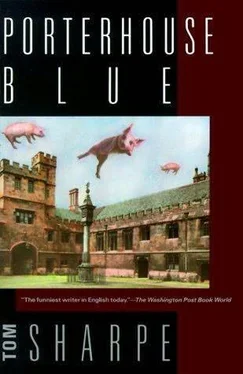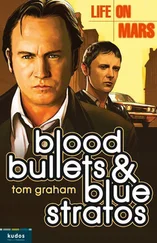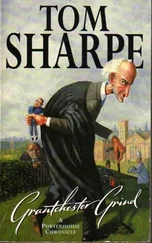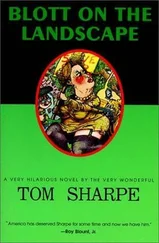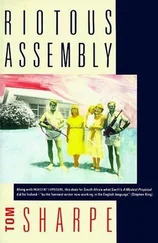He had morning coffee in the Copper Kettle, lunch in the Whim, and all the time his mind revolved around the question which had been bothering him since his arrival. The programme as he visualized it lacked the human touch. It was not enough to conduct a million viewers on a guided tour of Cambridge colleges. There had to be a moral in it somewhere, a human tragedy that touched the heart and raised the Carrington Programme from the level of aesthetic nostalgia to the heights of drama. He’d find it somewhere, somehow. He had a nose for the undiscovered miseries of life.
In the afternoon he continued his pilgrimage through Trinity and John’s and fulminated at the huge new building there. He minced through Magdalene and it wasn’t until half past three that he found himself in Porterhouse. Here, if anywhere in Cambridge, time stood still. No hint of concrete here. The blackened walls of brick and clunch were as they had been in his day. The cobbled court with its chapel in the Gothic style. its lawns and the great Hall through whose stained-glass windows the winter sun glowed richly: all was as he remembered. And with the memory there came the uneasy feeling of his own inadequacy, which had been his mood in those days, and which, in spite of his renown, he had never wholly eradicated. Steeling himself against this recrudescence of inferiority he climbed the worn steps to the Screens and stood for a moment studying the notices posted in the glass cases there. Here too nothing had changed. The Boat Club. Rugger. Squash. Fixture lists. With a shudder Carrington turned away from this reminder that Porterhouse was a rowing college and stood in the archway looking down into New Court with astonishment. Here things had changed. Plastic sheeting covered the front of the Tower and broken masonry lay heaped on the flags below. Carrington gaped at the extent of the destruction and was about to go down to make a closer examination when a small figure, heavily muffled in an overcoat, panted up the steps behind him and he turned to find himself face to face with the Dean.
“Good afternoon,” Carrington said, relapsing suddenly into a deference he thought he had outgrown. The Dean stopped and looked at him.
“Good afternoon,” he said, suppressing the glint of recognition in his eye. Carrington’s face was familiar from the hoardings, but the Dean preferred to pretend to an infallible memory for Porterhouse men. “We haven’t seen you for a long time, have we?”
Carrington shrank a little at the supposition that his viewers, however numerous elsewhere, did not include the Senior Members of his old college.
“To my knowledge you haven’t been back since… um… er,” the Dean fabricated a tussle with his memory, “nineteen… er thirty-eight, wasn’t it?”
Carrington agreed humbly that it was, and the Dean, secure now in his traditional role as the ward of an ineffable superiority, led the way towards his rooms.
“You’ll join me for tea,” he asked and Carrington, already reduced to a submissiveness that infuriated him, thanked him for the offer.
“I’m told,” said the Dean as they climbed the narrow staircase, “by those who know about these things, that you have made something of a name for yourself in the entertainment industry.”
Carrington found himself simpering a polite denial.
“Come, come, you’re too modest,” said the Dean, rubbing salt into the wound. “Your opinion matters, you know.” Carrington doubted it.
“You must be one of the few distinguished members the College has produced in recent years,” the Dean continued, leading the way down the corridor from whose walls there stared the faces of Porterhouse men whose expressions left Carrington in little doubt that whatever they might think of him distinguished was not the word.
“You just sit down while I put the kettle on,” said the Dean and Carrington left for a moment tried hard to restore the dykes of his self-esteem. The room did not help. It was filled with reminders of past excellence in which he had no share. As an undergraduate Carrington had shone at nothing and even the knowledge that these peers of his youth who stared unwrinkled from their frames, singly or in teams, had failed to sustain the promise of their early brilliance did nothing to console him. They were probably substantial men, if hardly known, and Carrington for all his assumed arrogance was conscious of the ephemeral nature of his own reputation. He was not and would never be a substantial man, a man with Bottom, as the eighteenth century and no doubt the Dean would phrase it, and Carrington was enough of an Englishman to resent his inadequacy. It was probably this sense of having failed as a good fellow, a solid dependable sort of a chap, which gave to his practised nostalgia for the twenties and thirties its quality of genuine emotion as if he pined for a time as mediocre as himself. He was rescued from his self-pity by the Dean who emerged with a tray from his tiny kitchen.
“Harrison,” said the Dean of the photograph Carrington had been studying self-critically.
“Ah,” he agreed noncommitally.
“Brilliant scrum-half. Scored that try at Twickenham in… now when was it?”
“I’ve no idea,” said Carrington.
“Thirty-six? About your time. I’m surprised you don’t remember.”
“I was never a great rugby man.”
The Dean looked at him critically. “No, now I come to think of it you weren’t, were you? Was it rowing, you were interested in?”
“No,” said Carrington, uncomfortably aware that the Dean knew it already.
“You must have done something in your years in College. Mind you, a lot of the young fellows who come up these days don’t do anything very much. I sometimes wonder what they come to University for. Sex, I suppose, though why they can’t indulge their sordid appetites somewhere else I can’t imagine.” He shuffled into his kitchen and returned with a plate of rock cakes.
“I was looking at the damage to the Tower,” Carrington began when the Dean had poured tea.
“Come to make capital out of our misfortunes, I suppose,” said the Dean. “You journalist fellows seem to be the carrion crows of contemporary civilization.” He sat back smiling at the happy alliteration of his insult.
“I wouldn’t really regard myself as a journalist,” Carrington demurred.
“Wouldn’t you? How very interesting,” said the Dean.
“I see myself more as a commentator.”
The Dean smiled. “Of course. How stupid of me. One of the lords of the air. A maker of opinion. How very interesting.” He paused to allow Carrington to savour his indifference. “Don’t you often feel embarrassed at the amount of influence you wield? I know I should. But then of course nobody listens to what I have to say. I suppose you might say I lack the common touch. Do have some more tea.”
In this chair Carrington regarded the old man angrily. He had had enough of the Dean’s hospitality, the polite insults and the delicate depreciation of everything he had achieved. Porterhouse had not changed. Not one iota. The place, the man, were anachronisms beyond the compassion of his nostalgia.
“One of the things that amazes me,” he said finally, “is to find that in a University that prides itself on scholarship and research, Porterhouse remains so resolutely a sporting college. I was glancing at the notices just now. No mention of scholarships or academic work. Just the old rugby lists…”
“And what did you get? A double first, was it?” the Dean enquired sweetly.
“A two two,” said Carrington.
“And look where it’s got you,” said the Dean. “It speaks for itself really. Let’s just say that we haven’t succumbed to the American infection yet.”
“The American infection?”
Читать дальше
